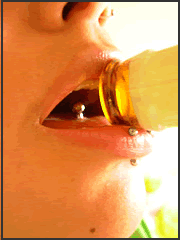 Health researchers at the University of Leeds are helping young people take the first steps towards reducing dangerous alcohol intake through an online personal analysis of their drinking behaviour.
Health researchers at the University of Leeds are helping young people take the first steps towards reducing dangerous alcohol intake through an online personal analysis of their drinking behaviour.
Unitcheck, a website developed and trialled at the University of Leeds, aims to change the habits of at-risk young drinkers, giving them a quick check on the number of units they are drinking, and information on whether this affects their health and how their drinking compares to their peers.
During the pilot scheme funded by the European Research Advisory Board, lead researcher Bridgette Bewick of Leeds Institute of Health Sciences, found that 5 per cent of those surveyed are regularly drinking at weekly levels associated with health risk.
Initial results show a reduction in drinking per occasion of approximately one unit during the trial and a three-month follow up shows this lowered intake had persisted.
A progress report on the government’s National Alcohol Strategy, published in June 2007 advises that women who regularly drink over six units a day and men who regularly drink over eight units a day are in the highest risk ‘binge drinking’ category.
Bridgette Bewick said: “Our approach indicates many of the young people surveyed did not realise how many units they were consuming on an average occasion. The heaviest drinkers surveyed were surprised to find the majority of their peers stay within sensible weekly limits. High levels of alcohol taken on a single occasion can be particularly damaging to health, so a small change in this pattern is a step in the right direction.”
The current trial is funded by the Alcohol Education and Research Council.
Professor Ray Hodgson, Director of AERC said: “Research that leads to a change in behaviour in relation to alcohol misuse has important implications for society as a whole. If feedback via the internet can be exploited to improve health then this will be a very low cost way to achieve positive benefits.”
Unitcheck is being rolled out to four other UK universities, and Leeds Primary Care Trust and the Institute of Health Sciences are looking at how the website could be modified and promoted to community groups, organisations and health professionals nationally and internationally.
Source: Leeds University via Alpha Galileo
